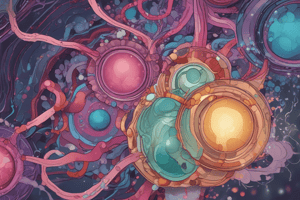Podcast
Questions and Answers
Which type of diabetes is primarily insulin deficiency and occurs primarily in children and young adults?
Which type of diabetes is primarily insulin deficiency and occurs primarily in children and young adults?
- Type 1 diabetes (correct)
- Type 2 diabetes
- Prediabetes
- Pancreatogenic diabetes
What is the primary purpose of airway clearance therapy in cystic fibrosis?
What is the primary purpose of airway clearance therapy in cystic fibrosis?
- To prevent chronic lung infections
- To improve CFTR gene function
- To assist in the removal of mucus from the lungs (correct)
- To thin mucus
What is released in response to high glucose levels in the blood and plays a role in glucose metabolism and storage?
What is released in response to high glucose levels in the blood and plays a role in glucose metabolism and storage?
- Amylin
- Somatostatin
- Insulin (correct)
- Glucagon
What can severe lung damage over time in cystic fibrosis necessitate?
What can severe lung damage over time in cystic fibrosis necessitate?
What characterizes type 2 diabetes?
What characterizes type 2 diabetes?
What can be a cause of pancreatogenic diabetes?
What can be a cause of pancreatogenic diabetes?
Which of the following hormones is secreted by the delta cells of the pancreatic islets of Langerhans?
Which of the following hormones is secreted by the delta cells of the pancreatic islets of Langerhans?
What is a common cause of acute pancreatitis?
What is a common cause of acute pancreatitis?
Which symptom is commonly associated with chronic pancreatitis?
Which symptom is commonly associated with chronic pancreatitis?
What is the primary pathogenesis of cystic fibrosis affecting the pancreas?
What is the primary pathogenesis of cystic fibrosis affecting the pancreas?
What are the mainstays of treatment for acute pancreatitis?
What are the mainstays of treatment for acute pancreatitis?
What are the functions of the exocrine glands in the pancreas?
What are the functions of the exocrine glands in the pancreas?
Which of the following is a function of the exocrine tissue of the pancreas?
Which of the following is a function of the exocrine tissue of the pancreas?
What is the primary function of lipase in digestion?
What is the primary function of lipase in digestion?
Which type of diabetes mellitus is characterized by insulin resistance and relative insulin deficiency?
Which type of diabetes mellitus is characterized by insulin resistance and relative insulin deficiency?
What is the principal role of glucagon in the body?
What is the principal role of glucagon in the body?
Which condition involves inflammation of the pancreas and requires immediate medical attention?
Which condition involves inflammation of the pancreas and requires immediate medical attention?
What is the primary focus of the exocrine tissue of the pancreas?
What is the primary focus of the exocrine tissue of the pancreas?
What is the primary cause of Hyperosmolar Hyperglycemic Nonketotic Coma (HHNC)?
What is the primary cause of Hyperosmolar Hyperglycemic Nonketotic Coma (HHNC)?
What are the predisposing conditions for hypoglycemia in diabetes?
What are the predisposing conditions for hypoglycemia in diabetes?
How does the pancreas regulate blood glucose levels?
How does the pancreas regulate blood glucose levels?
What is the primary goal of diabetes treatment?
What is the primary goal of diabetes treatment?
What causes gestational diabetes?
What causes gestational diabetes?
What are the complications associated with diabetes?
What are the complications associated with diabetes?
What are the other causes of hyperglycemia besides diabetes?
What are the other causes of hyperglycemia besides diabetes?
Flashcards are hidden until you start studying
Study Notes
Pancreas: Endocrine and Exocrine Functions
- Pancreas consists of exocrine glands (98-99%) for digestion and endocrine glands (1-2%) for glucose metabolism
- The endocrine function includes pancreatic islets of Langerhans, with alpha cells secreting glucagon, beta cells secreting insulin, and delta cells secreting somatostatin
- Acute pancreatitis can be caused by blockage, gallbladder disease, excessive alcohol consumption, trauma, infection, surgery, CF, or idiopathic causes
- Acute pancreatitis can lead to severe abdominal pain, multiple organ failure, shock, and high mortality
- Upper abdominal pain, nausea, vomiting are common symptoms of acute pancreatitis
- Diagnosis of acute pancreatitis involves elevated amylase/lipase and imaging with ultrasound or CT
- Treatment for acute pancreatitis includes fluids, pain management, and antibiotics
- Chronic pancreatitis is common in chronic alcoholism and leads to difficulty digesting and absorbing nutrients, diabetes, and bile duct blockage
- Diagnosis of chronic pancreatitis involves elevated amylase/lipase, X-ray or CT scan
- Treatment for chronic pancreatitis includes pain management, IV hydration, and pancreatic enzyme supplements
- Cystic fibrosis is a serious hereditary disease caused by mutation of CFTR, affecting the pancreas and other organs
- Cystic fibrosis pathogenesis involves defective transport of chloride, sodium, and water, leading to thick mucus that obstructs pancreatic ducts, bronchi, bronchioles, and bile ducts
Diabetes and Associated Complications
- Hyperosmolar Hyperglycemic Nonketotic Coma (HHNC) occurs in older, overweight, or obese adults
- Blood glucose levels increase 10 to 20 times normal value during HHNC
- Insufficient insulin leads to HHNC, causing extreme hyperosmolarity of blood and dehydration of cells
- Hypoglycemia in diabetes occurs due to insufficient or excessive insulin levels
- Conditions predisposing to hypoglycemia include skipping meals and vigorous exercise
- The pancreas regulates blood glucose levels by adjusting insulin output
- Treatment of diabetes involves diet control, insulin, and oral hypoglycemic drugs
- The goal is to achieve blood glucose control as close to normal as possible
- Complications of diabetes include diabetic coma, arteriosclerosis, blindness, renal failure, and peripheral neuritis
- Gestational diabetes is caused by high placental hormone levels during pregnancy
- Increased risk of T2D development is associated with gestational diabetes
- Other causes of hyperglycemia include chronic pancreatic disease, endocrine diseases, drugs, and hereditary diseases
Studying That Suits You
Use AI to generate personalized quizzes and flashcards to suit your learning preferences.





